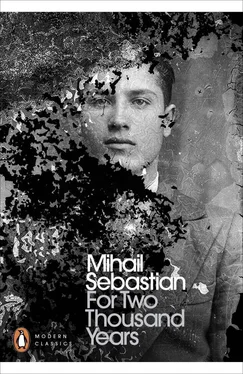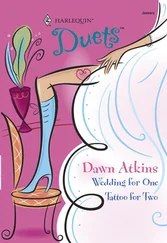Father’s side of the family haven’t known it, and I think this is something of a family rule, as there are no examples there of any grandparent or great-grandparent who has passed away before they were in their nineties. Their blood is strong, not thinned by Talmudism or poisoned by the lights of lamps and late evenings in synagogues. They lived by a river, among boats, among grain. Grandma looked down on them, when in their company. Their excess of good health probably struck her as a sign of vulgarity.
*
Several times this morning I went down to the port, to see the new tugs that have started to arrive. The light is cold and lively, washed by wind and rain. It smells of wet willow bark, the young shoots emerging from under the freshly melted snow. In the distance, the blue Măcin Mountains, their peaks still white.
From time to time, the call of a boat’s siren, its adolescent pitch like the whinnying of a foal.
Let us forget, old man. Let us forget what needs be forgotten: look, the season is turning.
Labouring in the workshop gets harder every day. This spring is unbearably beautiful. It bursts forth violently, as if in revenge for the five months of winter and the eighty days of snow it has tolerated. I continue to endure the morning classes, awaiting the reward of the noon bell of freedom. The streets seem wider, the houses white, the women glowing. There’s a sense of nakedness everywhere.
But on returning to the workshop everything goes dark, the season is blotted out. The modelling clay is sticky and strong-smelling, the air has the chill of a damp cellar. We work sullenly, irritably, unproductively. For four hours I worried away at a ball of clay and got absolutely nowhere. Towards evening Marga came by and took me out for a stroll, which made up for everything, and we walked long and far, towards Băneasa. We watched planes practising taking off and landing. Marga, who had never seen a plane up close, enjoyed it immensely, as though watching some miraculous spectacle.
She ran through the fields after the shadows of the planes, the wide shadow of a big bird, flying low, several metres above the ground, and let out a cry of victory whenever she managed to step on the tail of one of these fleeting shadows with the toe of her shoe.
Then, tired, she fell into my arms, flushed and breathless, her hair blowing loose in the gentle evening breeze — unable to laugh as much as she wanted, but happy. Exuberantly, noisily happy.
The evening fell slowly, like a fluttering flag, and we turned back towards the city, tired after so much fresh air.
‘Come and sleep with me, Marga.’
I said this to her so simply that she knew I was not joking. She let go of my hand. Not brusquely, but decisively. She is a virtuous girl, after all — and there’s nothing anybody can do about that.
Her moral resistance is more powerful than the most miraculous April dusk.
‘Moral resistance’ is overstating it. Really, it’s something more than a virtue: it’s an inability to cede. Somewhere in the mind of that sensual, loving girl is a voice that asks, ‘And, after that, what will become of you?’ That’s called foresight, and is also called mediocrity.
I don’t doubt either her sense of shame or her passion. But they are both equally modest. She doesn’t have enough of a sense of shame to resist embraces. Or sufficient passion to surrender to them completely. There is always a final line of caution, marking where the effusion must cease.
I’ve watched people playing roulette, contorted with suffering — but those who threw themselves into the game, losing everything, money, honour and life, didn’t seem as abject as the frightened players who trembled for every chip, made endless calculations every five minutes and bowed out the moment they’d lost a ‘reasonable’ amount. I think mediocrity in vice is the most dishonourable kind of mediocrity.
There is something of this fearful moderation in Marga’s way of hesitating. And the feeling that, even in our closest moments of understanding, she has taken, as they say, ‘all the necessary measures’ discourages me.
I know that from this point on any spontaneous action is out of the question.
I’d like to be a vulgar king of the slums, a charming rake, who could seduce his love and be indifferent thereafter. Marga’s excuses would be of the highest order and yet insufficient. Then the issue would not be me and what I can give in exchange, but what she can light-heartedly give away, with a total lack of precaution. In love you’re only worth as much as you can afford to lose.
*
I’m tired of myself, fed up with her. We’re splitting up. She’s a good girl and will make an excellent wife. She’s part of a race of wives.
I can’t recall: is there a female beloved, a lover, in the Bible? Seems there are only mothers, sisters and wives. It’s very nice, but stifling somehow.
I think from here, from this slow slipping into too many attachments, comes the Jew’s taste for solitude, a nostalgia for being on your own, like a stone. I envy the supreme insensibility of objects, their extreme indifference.
I walked back to the site from the station, after accompanying the master, who was taking the train to Braşov.
‘Who’d ever think they’ve been working here five years,’ he said to me on the way, at the corner by the river Ursu, from where you still see, among the tops of the oil derricks, some of the tops of the roofs of our buildings. It was an offhand comment and I didn’t sense he was looking for a sentimental reply from me. He’s not the kind.
‘Five years, indeed,’ I agreed.
At the station, awaiting the train, we again went over the work schedule for the coming week. I gave him some documents to sign and tried to reopen the discussion about the Rice villa, hoping to catch him in a more conciliatory mood in the moment of departure.
‘We might at least wait a few days, until old Ralph gets back.’
‘No, not an hour’s delay. Work will continue as planned. Understood? You’ll answer for any delay and I’ll brook no excuses. The work will continue, even if it rains. Tell Dronţu that.’
Then, because he’d spoken rather harshly, he took my arm and suddenly lowered his voice:
‘That’s how we work. If Rice doesn’t like it, he can demolish it. But all the same, that’s how we work.’
We separated, agreeing.
The day was still bright and I felt the need to wander about on my own. I told the driver to go on ahead and to tell Dronţu I’d be late for dinner.
Five years! I’d never given them thought, never counted them. The master’s reflections came back to me anew. Five years. I added them up — exactly five.
I can still recall that rainy day in March; the master, old Rice, Dronţu and I getting out of the automobile in the middle of Uioara, surrounded by frightened children and spied on by the entire village, holed up in their houses behind windows and curtains. Rice hadn’t anticipated entering a completely hostile area. All we had to go on was a vague notion from the papers about the conflict between Rice Ltd, Mining Surveyors, and the peasants who were the previous owners of the concession. In any case, I knew nothing about the extent of the conflict. Possibly not even Rice had any idea how serious things were, as he had signed a whole string of cheques and was under the impression that this had resolved everything. This bony American would never lose the awe-inspiring attitude of a man who could say, ‘I can pay!’ wherever he went, at any moment, to anyone.
That first walk of ours on the site was a sombre affair — Rice, calm, hands in pockets, the master with a silence that was at the same time interrogatory, Dronţu curious, looking in bafflement at the deserted little street, crossed only by an occasional panicked chicken, a sign at least that the place wasn’t utterly dead.
Читать дальше












